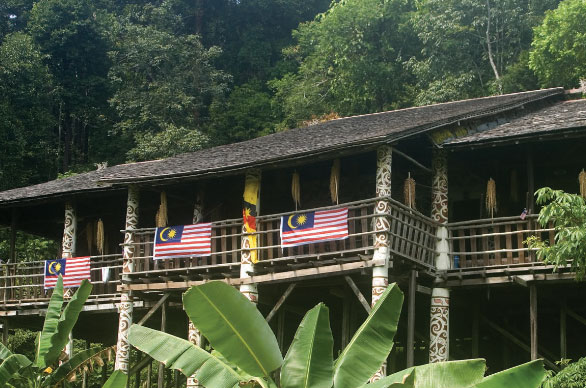Barisan Nasional’s (BN) 14th election manifesto sits close to the hearts of Sabahans and Sarawakians for its relevance, inclusiveness and being realistic. Local politicians even call it a comprehensive, ideal and farsighted manifesto that ensures a better future for these two autonomous states.
Working together
For Sabah and Sarawak, the spirit of the Malaysia Agreement 1963 (MA63) will be soaring high with power sharing between the state and federal governments to be realised “by consensus”. This means all parties – the federal government and Sabah and Sarawak must work together in the drafting and implementation of certain policies, taking into consideration the rights of the two Borneo states. Put it simply, it’s a pledge to resolve misgivings in reference to MA63 that safeguards the rights of Sabah and Sarawak.
“This method of consensus is the way and approach which we implement, that is, through consultations and discussions between the state government and the Federal government which had produced much results and successes for us,” said Sabah Chief Minister Tan Sri Musa Aman in a statement.
"In the manifesto, it is clearly stated that our state rights on matters such as oil and gas control and other financial matters would be restored to us as spelled out in the 1963 Malaysia Agreement,” Sarawak Chief Minister Datuk Patinggi Abang Johari Tun Openg assured.
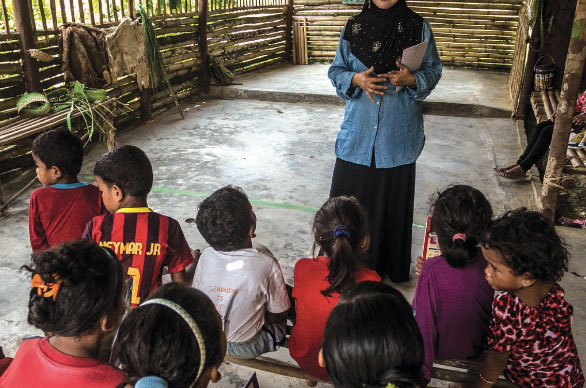
Enriching education
The real future lies in the hands of our children and grandchildren. This befits the education pledge of nurturing a future generation of knowledgeable minds and competent skills, in an environment that encourages creative and critical thinking.
Knowing that digital technologies are changing the way we live and work, our government aspires to equip five million students with digital skills to prepare them for the fourth industrial revolution. The technical and vocational education and training (TVET) is another skill development tool, in addition to learning at many of the existing higher learning institutions.
The government is endeavouring to improve education delivery through multifaceted measures such as upgrading and adding teaching aids and materials, running appropriate classroom sizes and reducing teachers’ administrative workload. Dilapidated schools in rural areas will be upgraded and the capacity of boarding facilities for rural students will be increased.
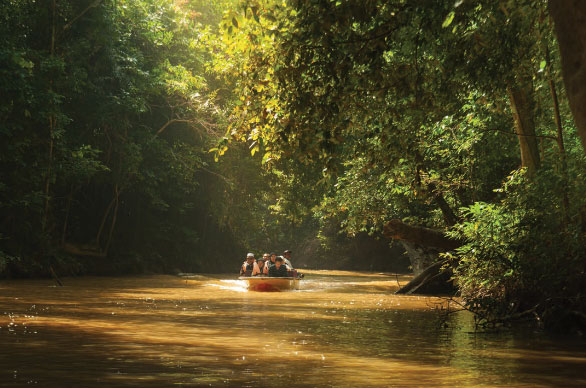
The government has also promised a special allocation for the Iban Language Unit of the Sarawak State Education Department and Kadazandusun Language Unit of the Sabah State Education Department to finance the training of teachers and purchase of instructional aids for the purpose of teaching the Iban and Kadazadusun languages. In addition, there will be a special allocation for the Kadazandusun Chair in Universiti Malaysia Sabah (UMS) to stimulate research relating to Kadazandusun language, culture and literature.
Plans are underway to increase the number of officers for services requiring fluency in Iban and Kadazandusun languages at the Ministry of Education, the Sarawak State Education Department and the Sabah State Education Department, to ensure the effective implementation and management of agendas relating to these two languages.
For the Dayak people, the recognition comes in the form of creating special programmes and assistance funds involving the surveying of Dayak customary land, Dayak entrepreneurs and the teaching of the Dayak language.
Unified Examination Certificate (UEC) holders from the Chinese independent schools and those who hold overseas examination certificates equivalent to Sijil Pelajaran Malaysia (SPM) and Sijil Tinggi Persekolahan Malaysia (STPM) with a credit in Bahasa Malaysia and a pass in History will be considered for enrolment at local higher learning institutions.
The development of human capital also takes historical understanding into consideration because it allows us to understand our past that will in turn provide us with insight into our future. Therefore, more historical facts and perspectives pertaining to Sabah and Sarawak will be incorporated into the syllabus of our history subject.
Other measures include special student discount cards for transportation, government services and education-related necessities, RM1,500 each for children of Bantuan Rakyat 1Malaysia (BR1M) recipients who get enrolment at higher learning institutions, RM12 million for special education programmes to rural communities benefiting 615,000 participants, and establishing Institute of Native and Indigenous Peoples Studies at Universiti Malaysia Sarawak and Universiti Malaysia Sabah.
Digital infrastructure and others
Special attention is also given to development in Sarawak and Sabah with a promise of a RM2 billion allocation to improve telecommunications coverage across the two states in the next five years, given their geographical factors. The government had earlier allocated RM1 billion under Budget 2018 for improving communications infrastructure including broadband access (internet coverage) to boost digital economy.
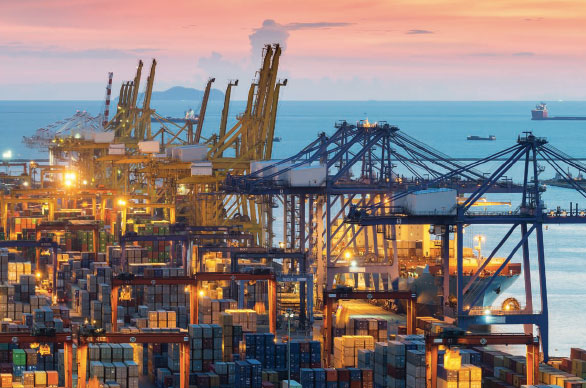
The government has also specifically allocated RM100 million to champion digital economy through the Malaysian Digital Economy Corporation (MDEC), targeting aspiring entrepreneurs and technopreneurs. The manifesto has also pledged a special fund for Sabah and Sarawak entrepreneurs under the ‘carve-out and compete’ initiative through the National Development Fund.
Other special provisions include strengthening transportation networks and interconnectivity in Sabah and Sarawak by upgrading 12,500 kilometres of rural roads, a RM2 billion allocation for the construction of Pan Borneo Highway, upgrading long-houses in Sarawak and water- houses in Sabah, building Customs, Immigration and Quarantine (CIQ) Complexes in Tebedu, Sarawak and Kalabakan, Sabah to foster economic growth and increase border security, a RM30 million allocation for surveying and mapping of Native Customary land; upgrading the Sabah railway track from Halogilat to Tenom, building the RM4.3 billion Trans Sabah Gas Pipeline (TSGP) to stabilise electricity supply and spur economic growth in Sabah, continuing the water subsidy in rural Sabah, establishing 3 sewerage schemes in Sabah, upgrading the Sandakan Airport; building two regional sewage treatment plants, sewerage pipeline networks and five septic sludge plants in Sarawak, building the Mukah and Lawas airports in Sarawak, and constructing a 73km access road to the hydropower Baleh Dam to improve transportation links and economy.
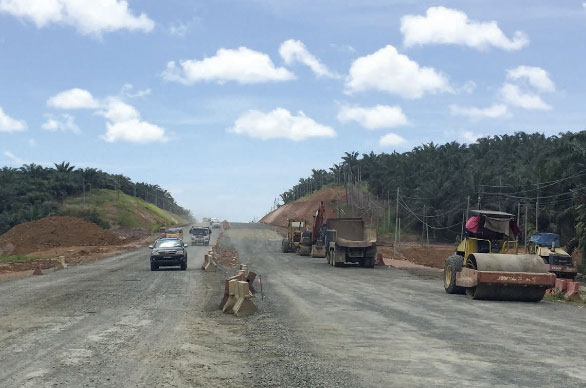
Stepping up border security
The federal government vows to enhance the weapon capabilities of security forces stationed in the Eastern Sabah Security Zone (ESSZONE), covering the districts of Kudat, Kota Marudu, Pitas, Beluran, Sandakan, Kinabatangan, Lahad Datu, Kunak, Semporna and Tawau. Strengthening land, sea and air defence capabilities is the key focus, in the face of attacks by pirates and militants from southern Philippines in particular. The weapons in use include Gempita AV8 amphibious armoured personnel carriers, M109 howitzers, new bullet-proof Rigid Hull Fender boats, Hawk fighter jets, S-70A Blackhawk helicopters, and M134D Hybrid Gatling machine guns. Airbus SPEXER 2000 Coastal radars are a major component of the Coastal Surveillance Systems (CSS). The enforcement is carried out by the Eastern Sabah Security Command (ESSCOM).
For added peace of mind, the government is stepping up border control with the enforcement of the Malaysian Border Security Agency (AKSEM) Act 2017. The newly enacted act grants AKSEM more autonomy and control over the enforcement work carried out at the country's borders, according to its director-general Datuk Mohamad Ismail.
Once again, in addition to the thumbs-up from the Chief Ministers of Sabah and Sarawak, other local leaders also laud the BN manifesto for its comprehensiveness and farsightedness.
“It is a complete assurance to Sabah and Sarawak that the BN leadership would continue to develop and uplift the two states to be on par with peninsular Malaysia,” remarked Parti Bersatu Sabah (PBS) acting president Datuk Seri Dr Maximus Onglili, who is also Energy, Green Technology and Water Minister.
“BN is the party that emphasises the interest of the people to enable them to enjoy better lives,” said Communications and Multimedia Minister Datuk Seri Dr Salleh Said Keruak, the former Chief Minister of Sabah.
